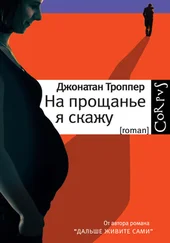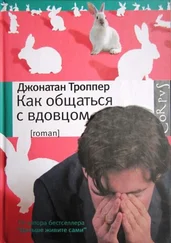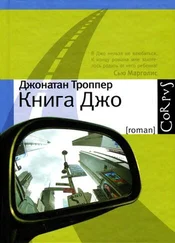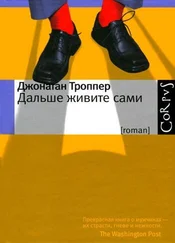Джонатан Троппер - This Is Where I Leave You
Здесь есть возможность читать онлайн «Джонатан Троппер - This Is Where I Leave You» весь текст электронной книги совершенно бесплатно (целиком полную версию без сокращений). В некоторых случаях можно слушать аудио, скачать через торрент в формате fb2 и присутствует краткое содержание. Год выпуска: 2009, ISBN: 2009, Издательство: Penguin Group (USA), Inc., Жанр: Проза, на английском языке. Описание произведения, (предисловие) а так же отзывы посетителей доступны на портале библиотеки ЛибКат.
- Название:This Is Where I Leave You
- Автор:
- Издательство:Penguin Group (USA), Inc.
- Жанр:
- Год:2009
- ISBN:978-1-101-10898-7
- Рейтинг книги:5 / 5. Голосов: 1
-
Избранное:Добавить в избранное
- Отзывы:
-
Ваша оценка:
- 100
- 1
- 2
- 3
- 4
- 5
This Is Where I Leave You: краткое содержание, описание и аннотация
Предлагаем к чтению аннотацию, описание, краткое содержание или предисловие (зависит от того, что написал сам автор книги «This Is Where I Leave You»). Если вы не нашли необходимую информацию о книге — напишите в комментариях, мы постараемся отыскать её.
This Is Where I Leave You — читать онлайн бесплатно полную книгу (весь текст) целиком
Ниже представлен текст книги, разбитый по страницам. Система сохранения места последней прочитанной страницы, позволяет с удобством читать онлайн бесплатно книгу «This Is Where I Leave You», без необходимости каждый раз заново искать на чём Вы остановились. Поставьте закладку, и сможете в любой момент перейти на страницу, на которой закончили чтение.
Интервал:
Закладка:
“Smoking weed,” I whisper.
“Jerking off.” Paul.
“Trying to touch my boobs.” Wendy.
“. . . and he leaves behind this legacy, his work ethic and his uncompromising values, for his children and grandchildren to carry on. May the Lord comfort the family among the mourners of Zion.”
“Amen,” the crowd responds.
“I’d like to call Hillary and her children up to the bimah now, to say Kaddish for their beloved husband and father, Morton Foxman.”
Mom stands up first and strides down the aisle in her stiletto heels like it’s a runway, garnering appreciative glances from the older men in the crowd, including Peter Applebaum, who shamelessly watches her ass the entire way down.
“She couldn’t find a longer skirt for temple?” Wendy mutters.
My siblings and I follow her up to the bimah, a raised table at the front of the room, where the cantor hands each of us a laminated sheet with the words of the Kaddish written in Hebrew and then transliterated in English. “Just read it slowly and pause at the dashes for the responses,” he says. “You’ll be fine.”
“Okay, everyone,” Paul says. “On three?”
“Yit’gadal v’yit’kadash sh’mei raba,” we say.
“Amen,” says the congregation, all rising to their feet.
“B’alma di v’ra khir’utei v’yam’likh mal’khutei . . .”
We read off the ancient Hebrew words, with no idea of what they might mean, and the congregation responds with more words that they don’t understand either. We are gathered together on a Saturday morning to speak gibberish to each other, and you would think, in these godless times, that the experience would be empty, but somehow it isn’t. The five of us, huddled together shoulder to shoulder over the bimah, read the words aloud slowly, and the congregation, these old friends and acquaintances and strangers, all respond, and for reasons I can’t begin to articulate, it feels like something is actually happening. It’s got nothing to do with God or souls, just the palpable sense of goodwill and support emanating in waves from the pews around us, and I can’t help but be moved by it. When we reach the end of the page, and the last “amen” has been said, I’m sorry that it’s over. I could stay up here a while longer. And as we step down to make our way back to the pews, a quick survey of the sadness in my family’s wet eyes tells me that I’m not the only one who feels that way. I don’t feel any closer to my father than I did before, but for a moment there I was comforted, and that’s more than I expected.
AS THE CANTOR drones on, I stick my hand into the pocket of Dad’s suit and discover what feels like an old, twisted tissue but turns out, upon further inspection, to be a very fat, bona fide, home-rolled joint. I palm the joint, hold it out over Phillip’s lap, and discreetly show it to him. The only thing wider than his eyes is his smile. “I have to go to the bathroom,” he says. He stands up and heads up the aisle. A few minutes later, I follow. The bathroom smells of powdered crotch, so we push open the double fire doors and head down the darkened hallways of the Temple Israel Hebrew School. Phillip finds an unlocked classroom and we sit down in miniature chairs, still wrapped in our prayer shawls.
“Where’d you get the doobage?” Phillip says.
“It was in Dad’s suit.”
“Dad was a stoner?” Phillip says. “So much about my life makes sense now.”
“Shut up. It was probably medicinal. They prescribe it for cancer patients.”
“I prefer to think that every once in a while Dad just liked to toke up and consider the universe.”
“Think what you want, just light the fucker.”
A few moments later, we’re sprawled at our tiny attached desks, while the three-dimensional letters of the Hebrew alphabet taped above the blackboard float over us in a smoky haze.
“Can you still read Hebrew?” Phillip says.
“I doubt it,” I say. “I know the letters, though.”
“Aleph, beth, gimel, daleth . . . ,” Phillip sings.
“He, vav, zayin, heth, teth, yod,” I chime in.
We sing the rest of the Aleph-Bet together solemnly, like a funereal psalm, and when we’re done, our voices echo briefly in the room.
“I miss Dad,” Phillip says.
“I do too.”
“I feel very alone. Like when I mess up now, he won’t be there to help me.”
“I guess we’re officially adults now.”
“Fuck that,” Phillip says, taking an extra long pull on the joint. He blows out a perfect ring and then blows a jet of smoke through it. When it comes to worthless frat-boy skills, Phillip is second to none. He can light a match with his thumbnail, open a beer bottle with his teeth, flip a cigarette from the carton to his mouth with a flick of his wrist, play the William Tell overture by flicking his fingers against the soft underside of his jaw, burp the national anthem, fart on cue, and dislocate his shoulder upon request.
“Do you think maybe that’s why you’re with Tracy?” I say. “Because you want to know there’s someone looking after you?”
Phillip lazily passes me the joint. “I don’t know, but I like that theory much better than the one that postulates I’m trying to sleep with Mom.”
The door to the classroom flies open. “What the hell?” Paul says. “Oh. Christ.”
“In or out,” I say.
“I should have known.” He steps into the room, closing the door behind him.
“We learned from the master,” Phillip says.
“Give it here.” Paul takes a drag and sits down in one of the chairs. “Damn! That is some strong shit. Where’d you get it?”
“Dad,” I say, indicating the blazer. “A gift from the beyond.”
“I wouldn’t have pegged Dad for a fan of the weed.”
“People can change,” Phillip says.
“People are who they are,” Paul says, leaning back in his little chair to take another generous drag. “I really miss him,” he says.
“Me too,” I say.
“Me three.” Phillip.
A ray of sunlight comes through the window, passing through the thick cloud of ganja smoke in a way that makes you think of God and heaven, and we sit there getting baked in our skullcaps and prayer shawls, three lost brothers in mourning, the full impact of their loss only now beginning to dawn on them.
“I love you guys,” Phillip says, just as the smoke alarm goes off and the sprinklers come on.
FORTUNATELY, THE SPRINKLERS in the sanctuary are in a different zone and must be set off independently, so the worshippers do not get soaked as they evacuate the building. In the classroom, though, the water rains down on us as Phillip grabs what’s left of the joint, still lit, and swallows it whole, with the confidence of someone for whom joint swallowing is a routine practice. The sprinklers have also been activated in the hallway, and we run through the indoor storm, stopping at the fire doors that lead to the lobby area. Peering through the narrow vertical windows of the door, we can see the crowd moving through the lobby and out the glass doors to the synagogue’s front lawn.
“Just act casual,” Paul says. “Blend in.”
It seems easy enough, only because we’re too stoned to realize that three men dripping in their suits might stand out.
The air-conditioning is cold against my wet clothes. We discard our soaked prayer shawls and join the crowd moving out the doors and soon find ourselves standing in the parking lot, being warmed by the late-morning sun.
“What did you do!” my mother shouts, her heels clattering on the asphalt as she storms over to us. Wendy follows behind her, enjoying every second of it.
Читать дальшеИнтервал:
Закладка:
Похожие книги на «This Is Where I Leave You»
Представляем Вашему вниманию похожие книги на «This Is Where I Leave You» списком для выбора. Мы отобрали схожую по названию и смыслу литературу в надежде предоставить читателям больше вариантов отыскать новые, интересные, ещё непрочитанные произведения.
Обсуждение, отзывы о книге «This Is Where I Leave You» и просто собственные мнения читателей. Оставьте ваши комментарии, напишите, что Вы думаете о произведении, его смысле или главных героях. Укажите что конкретно понравилось, а что нет, и почему Вы так считаете.







![Джонатан Троппер - Как общаться с вдовцом [litres]](/books/429483/dzhonatan-tropper-kak-obchatsya-s-vdovcom-litres-thumb.webp)
![Джонатан Троппер - Дальше живите сами [litres]](/books/429484/dzhonatan-tropper-dalshe-zhivite-sami-litres-thumb.webp)



